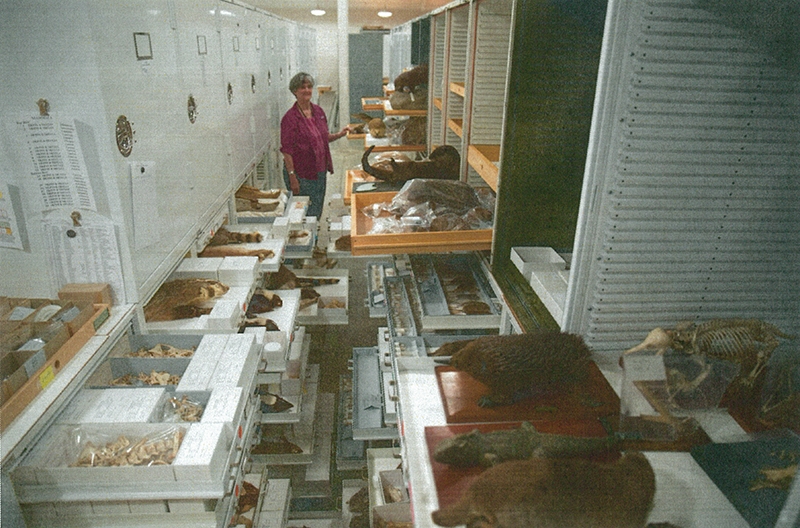Nancy McCartney, curator of zoology for the University of Arkansas Museum, will be retiring on June 27 after 44 years with the museum.
She joined the museum staff as a part-time curator in 1974 after earning her bachelor's, master's and doctoral degrees at the University of Wisconsin-Madison. In 1995 she took on additional duties as director of the Museum's Discovery Room, a hands-on learning center for children K-12. In 2003 the Discovery Room closed and McCartney became the full-time curator of zoology at the Museum Collections facility.
As curator of zoology, McCartney curated the mammal, bird, herp, fish, and mollusk collections. During her tenure as curator, she was responsible for saving a major collection of fish and herps from being lost. This fish and herps collection is now the core of the museum's extensive fluid collection, which includes specimens of the threatened Ozark Cavefish. She was responsible for locating and consolidating within the museum the university's holdings of mammal skeletal material.
Another highlight of her career was acquiring a black rhino from the Dallas Zoo, which she and graduate assistants flenshed and prepared for inclusion in the disarticulated mammal skeleton collection. McCartney also curated the Museum's passenger pigeon and other whole mount specimens, and the bird study skins and egg collections.
McCartney's greatest contribution to the museum collections was to rehouse the mammal, bird and mollusk collections, organize them in current taxonomic order, and to enter their relevant collecting data in the museum's collections records database. Rehousing the zoology specimens was made possible with a series of Institute of Museum and Library Services grants that McCartney, as the principal investigator, used to purchase museum-quality storage cabinets. The rehousing and database effort makes these specimens and their data completely accessible to researchers and students. In addition to making the specimen data available in-house, she also sent the collections data for vertebrate species to the international website, iDigBio, where that data can now be accessed by researchers worldwide.
As the director of the Discovery Room, McCartney scheduled school group visits to the facility and staffed the facility for general open hours. She invited professors and graduate students to conduct educational childrens' programs for Discovery Room visitors. She organized volunteers to help run the facility, and coordinated with K through 12 school curricula so that Discovery Room programs were relevant to the local schools.
McCartney was engaged in outreach activities in other way as well. She curated several extensive exhibits, such as those on amber, mollusks, and women in science. She gave several presentations to outside groups, most notably on the passenger pigeon. She has made the collections readily available to UA faculty and students, and she has made research and exhibit loans to outside institutions.
McCartney worked with many graduate assistants over the years, and remembers many of them fondly. The museum will sorely miss her entertaining tours of the zoology section, her helpful advice on exhibits and public outreach, and mostly her constant and vigilant care of the zoology collection.
Topics
Contacts
Mary C. Suter, project/program specialist
University Museum
479-575-3456,
